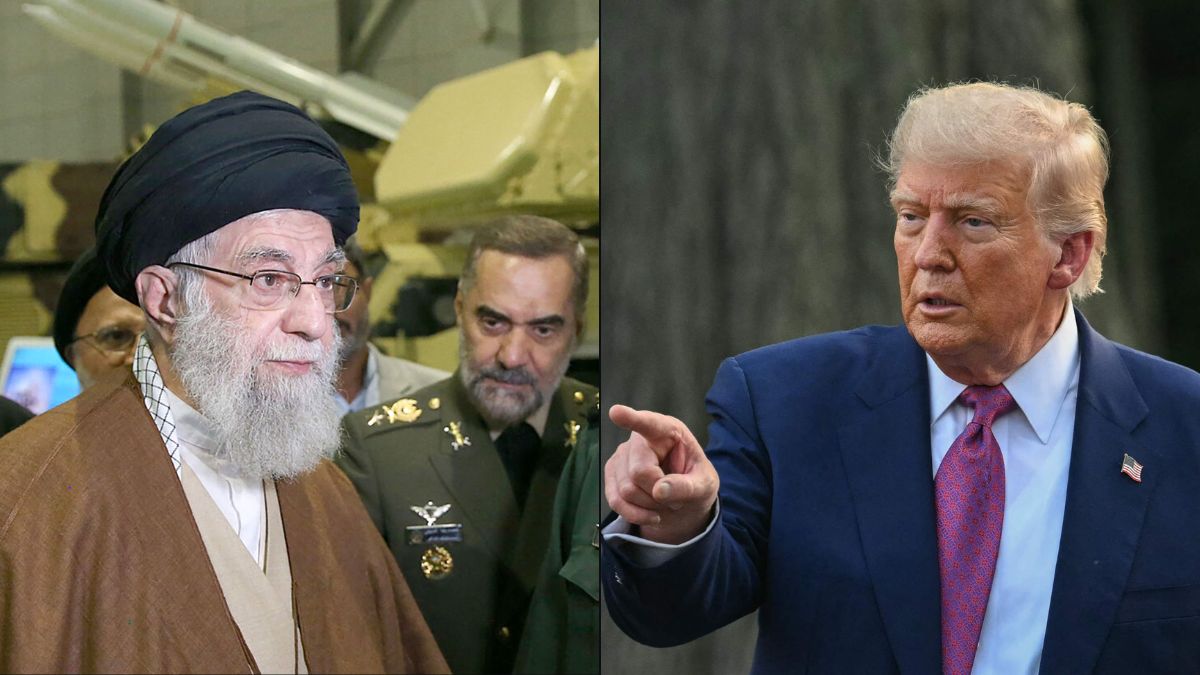Israel-Iran conflict: US President Trump offers a two-week window for diplomacy before launching bombs against Tehran
 Iran Supreme Leader Ayatollah Khamenei (left) and US President Donald Trump [File photos] | AFP
Iran Supreme Leader Ayatollah Khamenei (left) and US President Donald Trump [File photos] | AFP
President Donald Trump has said he will decide within the next two weeks whether the United States will launch military strikes against Iran, while also suggesting there remains a chance of renewed diplomacy. The statement, released by the White House on Thursday, reflects a shift from Trump’s earlier rhetoric in which he repeatedly hinted at imminent action against Iranian nuclear sites.
Over recent days, Trump has vacillated between advocating diplomacy and openly contemplating military action. His latest remarks suggest a pause, giving time to explore options that could reduce the risk of a broader war. The delay also allows US forces to improve readiness and offers Iran a final opportunity to re-engage in talks suspended after Israel began bombing Iranian targets a week ago.
White House press secretary Karoline Leavitt confirmed that Steve Witkoff, Trump’s special envoy to the Middle East, remains in contact with Iranian officials, though she declined to elaborate. Leavitt reiterated that any deal would need to end uranium enrichment and prevent Iran from acquiring a nuclear weapon.
Iran pulled out of nuclear discussions following the initial wave of Israeli airstrikes. On Thursday, the sixth day of hostilities, Israel launched another series of attacks on Iranian targets, including a nuclear complex at Arak. Israeli Defence Minister Israel Katz declared that military operations would intensify to eliminate threats to Israel, after an Iranian missile strike damaged Soroka Medical Center in Beersheba. The hospital, which had been largely evacuated, reported only minor injuries. Tehran claimed it had aimed at nearby military facilities.
The Israeli military said it had hit several Iranian sites, including an inactive reactor at Arak and a facility in the Natanz region. Iranian state media acknowledged the strikes but reported no significant damage.
Israeli Prime Minister Benjamin Netanyahu stated that Israel has the means to achieve its goals independently, though he acknowledged US pilots had participated in defending Israel against drone attacks. Whether American forces will join offensive operations remains at Trump’s discretion.
In Washington, British Foreign Minister David Lammy met American Secretary of State Marco Rubio and envoy Witkoff, describing the situation as “perilous.” He said a two-week window now exists to reach a diplomatic solution, echoing Trump’s timeline. Lammy will travel to Geneva to meet the Iranian foreign minister along with French, German and European Union counterparts. In a written statement, he warned against regional escalation and insisted Iran must not be allowed to obtain a nuclear weapon.
Trump’s announcement is being cast by the White House as a final opportunity for diplomacy, even as Israeli strikes continue. The president now has time to assess whether the damage inflicted on Iran’s nuclear infrastructure—particularly the loss of one of its two major uranium enrichment centres and significant portions of its missile arsenal and nuclear personnel—has altered Tehran’s calculus.
The earlier deal rejected by Ayatollah Ali Khamenei, which would have phased out uranium enrichment on Iranian soil, may now appear more palatable to Iran’s leadership. Alternatively, the military losses may harden its resolve. There is also speculation that Trump’s announcement could be a tactical ploy to lull Iran into lowering its defences.
The two-week delay also gives the American military time to position additional assets in the region. A second aircraft carrier is expected to arrive, enhancing the ability to counter any Iranian retaliation. Simultaneously, it gives Israel time to neutralise Iranian air defences around sensitive sites like the Fordo enrichment facility, potentially reducing risks to American forces if strikes proceed.
Trump’s decision to pause may also help him regain control of the timeline, distancing US action from Netanyahu’s more aggressive schedule. The Israeli PM has been urging Washington to join the fight, seeking access to American capabilities that Israel does not possess.
“The president has made it clear he always wants to pursue diplomacy,” Leavitt said. “But believe me, the president is unafraid to use strength if necessary. And Iran and the entire world should know that the United States military is the strongest and most lethal fighting force in the world and we have capabilities that no other country on this planet possesses.”
Middle East